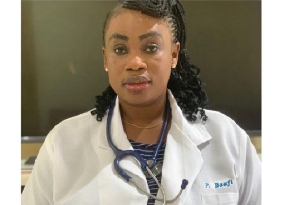Health News of Wednesday, 15 April 2020
Source: mPHARMA
mPHARMA donates coronavirus testing equipment to Noguchi Memorial Institute
Ghanaian based Pharmaceutical services company, mPharma with branches in Nigeria, Kenya, and Zimbabwe has donated a COVID-19 testing equipment (Molecular workstation) to the University of Ghana Noguchi Institute for Medical Research.
The molecular workstation which costs over 30 thousand dollars is to help NOGUCHI rapidly test samples of COVID-19 suspected cases remotely in the communities or outside the Institute while reducing waiting time.
In the wake of the COVID-19 pandemic, Noguchi Institute for Medical Research has been at the forefront testing thousands of samples of suspected COVID-19 cases.
In accepting the donation and expressing appreciation on behalf of the Vice-Chancellor of the University of Ghana, the director of the institute, Professor Abraham Kwabena Annang explained the importance of the equipment and how it will enhance the institute's activities and Ghana's fight against COVID-19.
"When it comes to responding to public health emergencies, there are some very key principles that we look at: the first one is prevention, the second one is detection and then of course diagnosis. So when it comes truly to a disease like COVID-19, prevention is our key.
"Now for us to prevent, we need to be able to know where the disease is and where it is coming from or going and the only way to know is detection or testing. The special thing about this donation is that the molecular workstation that has been presented to the University of Ghana NOGUCHI Institute for Medical Research is fairly unique and the first one we are having now. It is unique because this equipment is made such that we can just lift it with ease, take it anywhere in the country and do testing..." Prof noted.
Chief Executive Officer of mPharma, Gregory Rockson said it became essential for mPharma to donate the molecular workstation to the institute to enable its health workers to test while on location picking samples. "The good work NOGUCHI has been doing in leading the way in this country, we believe that the way for us to continue to have a handle on this pandemic is for us to boost the testing capacity in the country.
So working with our partners, we are donating today, a portable molecular workstation. This equipment is very important because it allows Noguchi to do remote testing which means NOGUCHI will be able during contact tracing, test people as they are tracing them without having to wait to bring in samples to the lab to test.
In addition to this equipment, we are also providing reagents that will enable Noguchi to test thousand people initially using this device. We will continue to support the work NOGUCHI is doing with further donations so that we can ensure many people that need to be tested in this country are tested"
On the other hand, Dr. Samuel Kaba Akoriyea who is Ghana's leader of the COVID-19 testing team, at the event indicated that the testing equipment is the most essential need in this era of the pandemic adding ventilators are the last resort. "For the past months, you all have been hearing people talking about ventilators.
People have come to know ventilators as if it is now a regular machine but the reality is that a ventilator is the last resort we need in the management of COVID-19, when you are critical and about to die, then you just need it but we don't need to get there.
What is critical to us is for us to detect as early as possible and treat people which means that one of the most important pillars of the management of COVID-19 is laboratory testing. So today, on behalf of the Minister and Director-General of the Ghana Health Service we want to say thank you to mPharma because this is what we need and this is what will make the difference. Test early, diagnose early, treat early. When people are diagnosed early, many of them survive".












